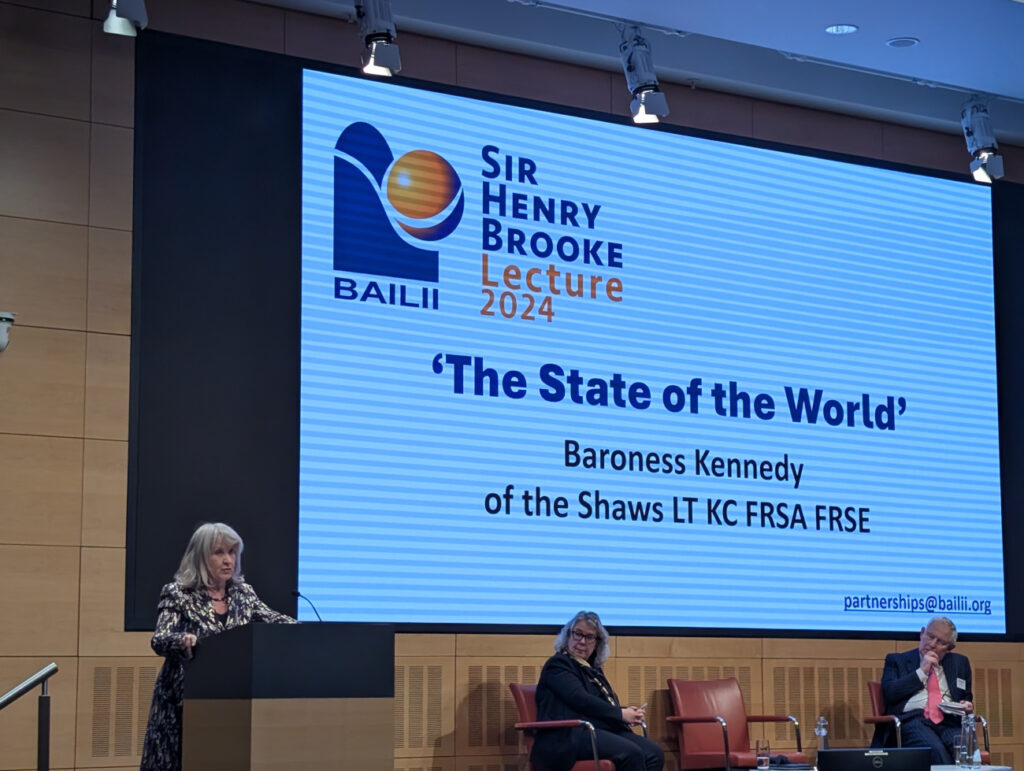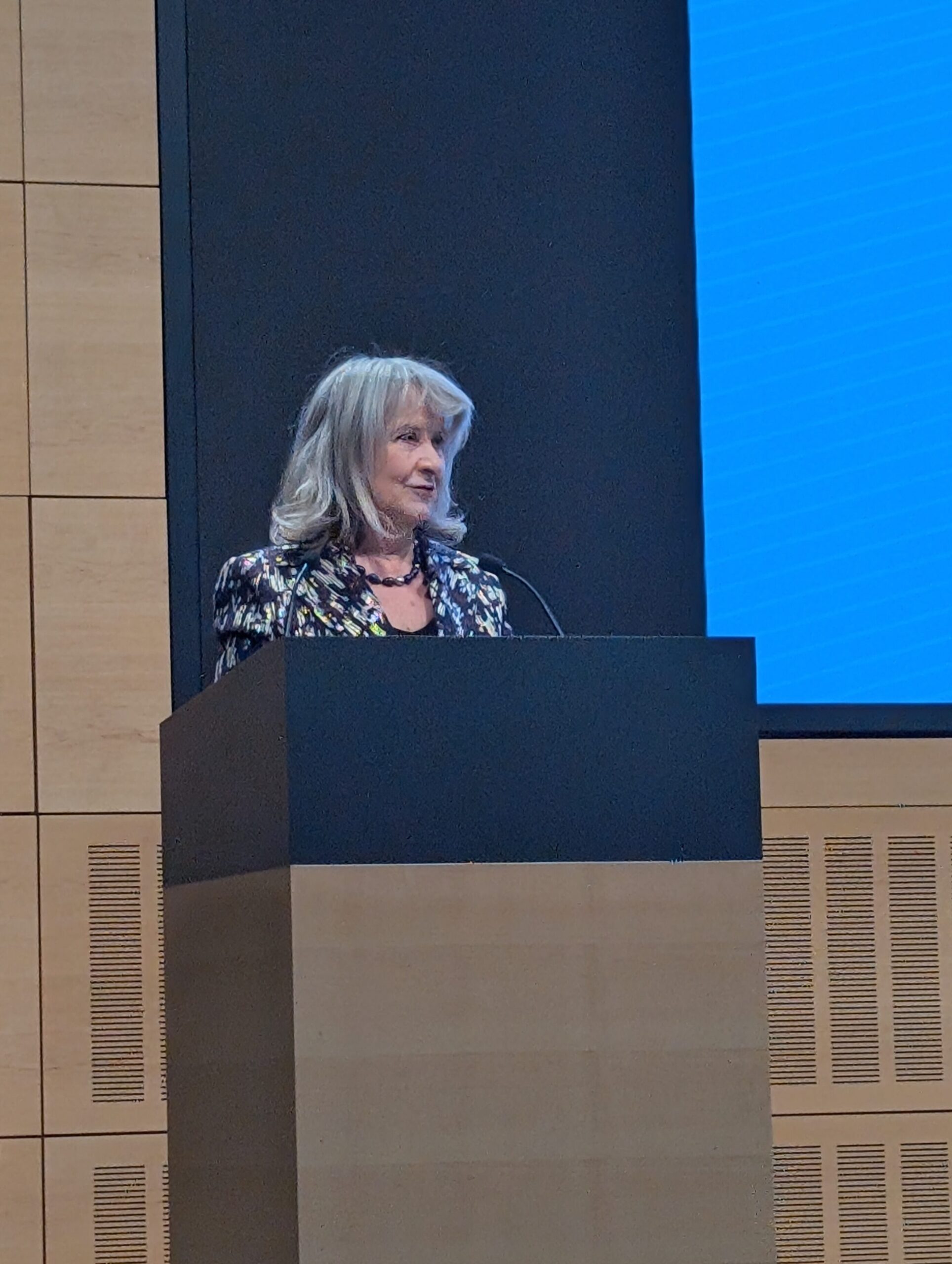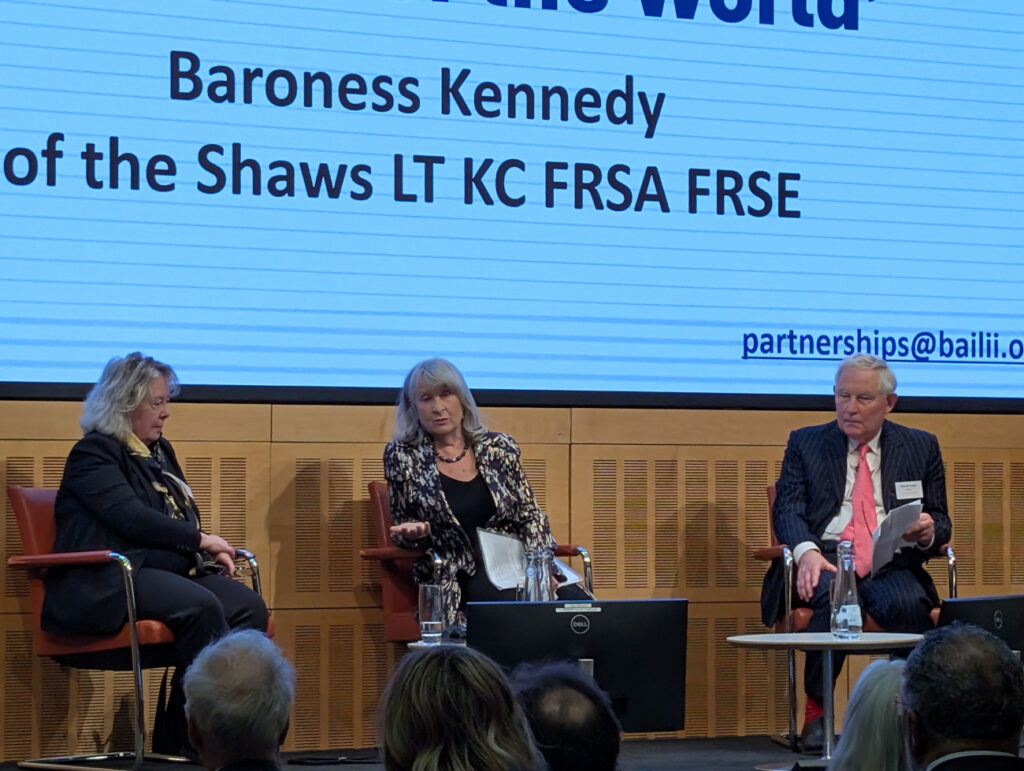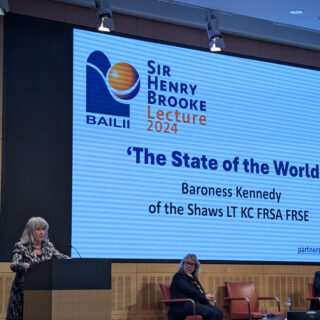BAILII (the British and Irish Legal Information Institute) has been making the law accessible since its pilot back in 2000. The charity emerged out of a campaign to ‘free the law’ given that it was at that time impossible for individuals or organisations to gain access to primary law sources without a subscription to expensive legal databases. They are still performing this indispensible role 24 years later! For the last decade they have also hosted an annual lecture, each featuring an incredible individual from the world of law. The series is named for Sir Henry Brooke, founding Chair of BAILII. Sir Henry retired from the Court of Appeal in 2006 and used his retirement to campaign for the issues he felt strongly about. He was deeply committed to how transformative technology could be when applied to the justice system.
This year it was the turn of Baroness Kennedy of the Shaws to deliver the 10th BAILII Sir Henry Brooke Lecture. The Hon. Mrs Justice McGowan gave the introduction, which included insights into her remarkable achievements (42 Honorary degrees!), both in practice and within the House of Lords. Maura also spoke of the work done by a small network of women judges in the UK to help those Afghan women judges whose lives were in peril when the government fell. She recounted how they had worked hard to get help to them, arrange sponsorship for their arrival once in the UK, but then Helena came on board, “produced a black book like you have never seen” and then aeroplanes were found to get them out of Kabul safely.
You can view this lecture in full via YouTube (and indeed get sight of all those from previous years) but here’s a summary of it from one of the Lawbore journalist team, Chloe.

On 21 November 2024, I had the pleasure of attending the 10th BAILII Sir Henry Brooke Lecture on ‘the State of the World’, given by Helena Kennedy KC. The session was incredibly inspiring and thought-provoking. Baroness Kennedy shared her perspectives and reflections on a number of global events and histories, as well as their profound impact on the rule of law internationally. If you are interested in International Law and Human Rights Law, you wouldn’t want to miss it!
About the Speaker
Baroness Helena Kennedy of the Shaws LT KC FRSE FRSA (‘Baroness Kennedy’) is one of the most successful and distinguished lawyers in the UK. She is a barrister at Doughty Street Chambers. She has been a Labour member of the House of Lords for over a quarter of a century. Her contributions to social justice, public service, civil liberties, women’s and children’s rights, gender equality and minority access have been recognised worldwide.
First Half of the Lecture

During the first half of the lecture, Baroness Kennedy predominantly reflected on a series of global affairs and the erosions of the post-World War II Rules-based International Order, which aimed to avoid conflicts and safeguard individual human rights. She began the session by recalling a lecture she had given at the turn of the millenium, in which she was optimistic that the 21st century would be the century of human rights, after witnessing the Human Rights Act come into force in the UK and the arrest of Augusto Pinochet. She felt these surely marked a major success and triumph for international human rights. However, within a year of that lecture, the 9/11 terrorist attacks and the Iraq War took place, which proved her wrong and symbolised a shift in global priorities. From then on, she saw the world from a whole new perspective. Instead of being optimistic, she now recognises that the world is in fact in crisis, with wars, disasters, and political turmoil, and so forth. She provided a few examples, such as the incidences of rising authoritarianism and nationalism across the world.
Baroness Kennedy’s perspective on International Law has evolved over time. Within her lecture, she detailed the unravelling of legal frameworks after the Second World War, which included the establishment of the International Court of Justice and the Universal Declaration of Human Rights, both of which aimed to prevent atrocities like the Holocaust. On top of that, she traced the creation of multiple international conventions, whilst recognising that they have not always been fully implemented or respected. A few examples of such conventions are the Refugee Convention and the Genocide Convention, which seek to enshrine human rights in global law.
Although respect for the rule of law over the years has at times been disappointing, Baroness Kennedy was heartened by the recent positive appointment of law officers to the positions of Attorney General, Lord Chancellor and Solicitor General (Richard Hermer KC, Shabana Mahmood and Sarah Sackman) in this country, and for their voiced-commitment to upholding the rule of law. She commented however that authoritarianism is increasingly influencing the global situation, creating hurdles to securing human rights and peace.
Second Half of the Lecture

In the second half of the lecture, Baroness Kennedy focused heavily on the development of International Human Rights Law and the erosions of the inherent principles in recent years. She remarked that while adherence to the law of war was not always followed, there was an incremental shift towards humanizing our systems, with an expectation of and demand for better behaviour from nations. She acknowledged that the end of the Cold War did mark an optimistic era, with substantial geopolitical changes. For instance, Apartheid in South Africa came to an end in the early 1990s, the Soviet Union collapsed in 1991, and democracy and market economies seemed to prevail over the years. During this period, the International Criminal Court was established (in 2000), which enabled the prosecution of individuals responsible for human rights abuses. This included Charles Taylor, the former Liberian president held accountable for atrocities committed during the 1990s civil war in Sierra Leone.
It is worth mentioning that prior to the aforementioned optimistic era, the world was, in fact, in a darker phase. Baroness Kennedy referenced the US War on Terror, a global military campaign launched by the US in response to the 9/11 terrorist attacks, which undermined human rights. She pointed to a number of issues that demonstrated the erosion of legal standards, and over time, nations appeared to neglect fundamental human rights principles, resulting in a rise in authoritarianism and a disregard for International Law.

She highlighted that several countries have committed serious breaches of International Law and Human Rights, such as transnational oppression, the targeting of opposition leaders, women’s rights and the suppression of free speech and democracy.
Furthermore, she mentioned that while sanctions had long been imposed on States, the personal liability on individuals for crimes against humanity and human rights abuses was yet to be introduced. This changed with Magnitsky Sanctions, which allow Governments to impose sanctions on individuals and entities responsible for human rights abuses and corruption across the world. Baroness Kennedy spoke of these positively, in terms of their ability to strengthen International Law. Nevertheless, the global order remains utterly fragile, with democratic principles under attack in many nations in the world.
Some Final Thoughts…
To conclude the lecture, Baroness Kennedy reiterated that she was deeply heartened by the appointment of the new cohort of law officers and was glad that we have a competent prime minister in the UK, who understands that the rule of law is absolutely crucial and fundamental to improving the world.

She also emphasised that strong legal structures play a vital role to maintaining democracies. We, as individuals must brace ourselves and be prepared for hard times and serious challenges any time. She has a strong belief in Britian’s enduring strength because our voices can matter and make a great difference. We don’t get to decide who has broken the law, but we can also never be silent. That, she said, is how we uphold justice and stand against violations.
In BAILII’s 24th anniversary year, they are looking for donations to fund the very modest costs of maintaining and extending their free-to-access databases of legal information. If you value access to justice and/or you use BAILII, please donate today.
Many thanks to Chloe Yuet Ng for this engaging report on the Advocacy event. Chloe is a current Bar Vocational Studies (LLM) student at the City Law School, with a special interest in Family Law. She enjoys meeting new people and spreading positive energy!

